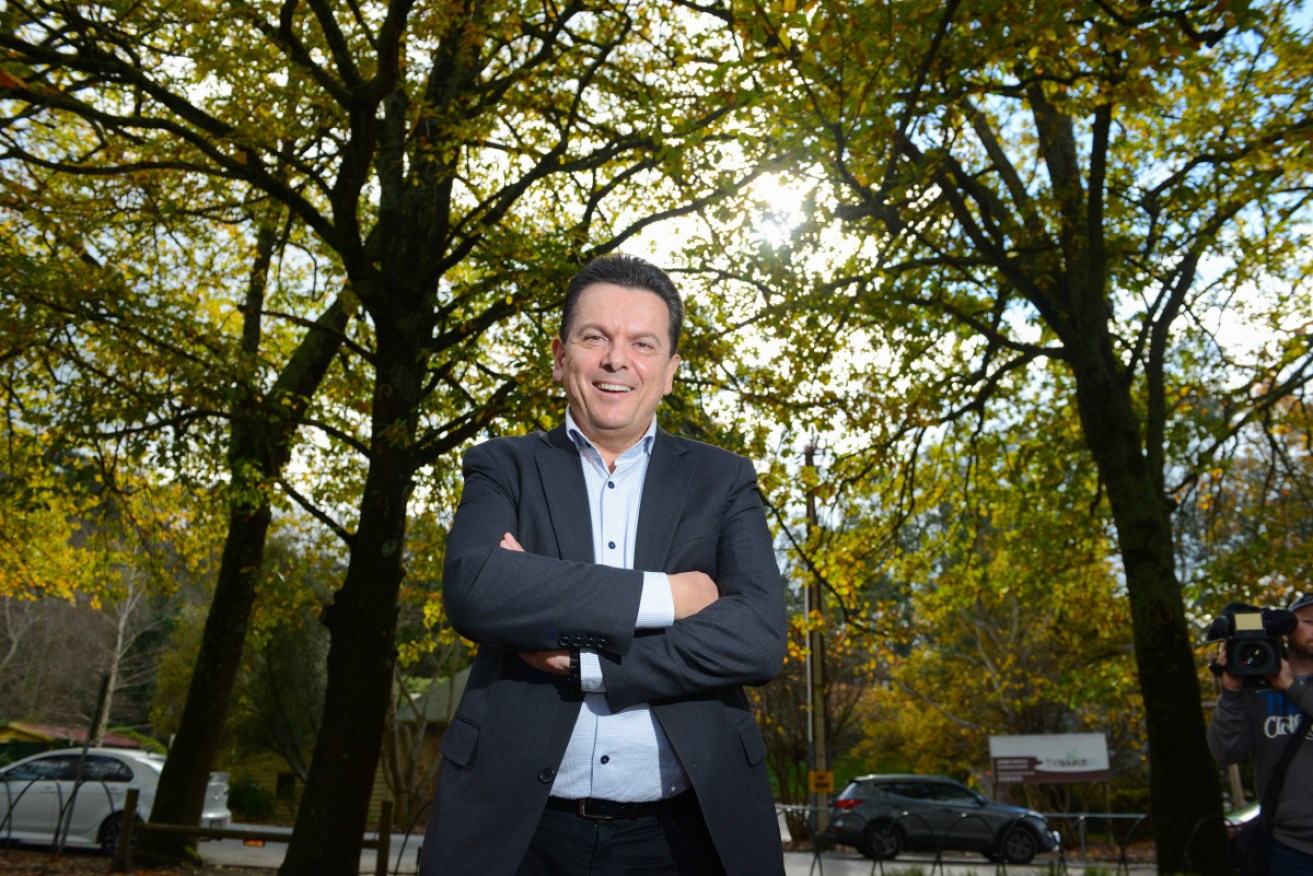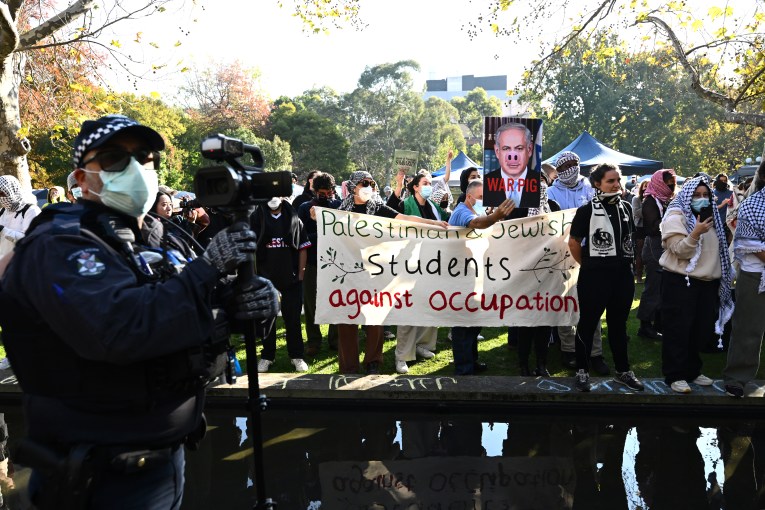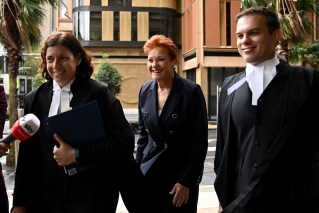Nick Xenophon reveals how family hardship inspired his return to politics


Former senator Nick Xenophon is looking to return to the upper house at the next federal election. Photo: Getty
Nick Xenophon is back.
With his durable popularity in South Australia, his election should be all but assured (and end the short political career of his replacement, Senator Rex Patrick, who now appears certain to resign or chance his arm in the lower house).
But it has been nearly five years since one of the most recognisable players in recent politics sensationally quit federal Parliament to focus on South Australia.
The political landscape has changed plenty in that time. But has he?
Yes, Mr Xenophon says, thoughtfully.
The South Australian gambit, while not entirely unsuccessful, failed its ambitious aims. That, he said, taught him something about himself.
“There was support for [our state party] … I think I need to do what I do best as an independent, not constrained by party, being able to be agile on responding to issues,” he said.
SA Best, Mr Xenophon’s vehicle, still claimed an impressive 14 per cent of lower-house votes – closer to 20 per cent in the upper house.
But it was not enough to achieve its ambitious program of reforming the state’s democracy.
The legacy of this brief foray was evident during the weekend’s counting for the state election. To which party SA Best voters would switch allegiance was viewed as decisive.
One source close to Mr Xenophon and intimately familiar with the South Australia switch said it neutralised his greatest political asset: An unwavering focus. That was difficult to reconcile with a team of sometimes disparate and even restive candidates.
“He started showing a desire to please that we had never seen before,” the source said.
“It wasn’t like he lost his conviction, but it just wasn’t the same intensity.”
A singular focus
Several concerns of long standing have helped fuel that passion, cracking down on poker machine restrictions and fighting to protect the Murray River among them.
His crusades haven’t always succeeded; concessions thought to have been won were later withdrawn and, famously, he never got to see pokies curbed or repealed as he thought he would.

The Pokie-Leaks campaign was initiated by Mr Xenophon along with Independent MP Andrew Wilkie and Greens Senator Larissa Waters. Photo: AAP
But he was involved in the repeal of WorkChoices and opponents rate him as one of the canniest, most open-minded and persistent negotiators of his political generation.
It did not take long for Mr Xenophon to transition from the centre of public life to something close to normality, a process many career politicians struggle with.
In fact, advertisements for his law firm featuring “no win, no fee” promises began appearing on supermarket dockets and in newspaper classified pages with remarkable speed.
But as he tells it, although he made a genuine attempt to break with the political life, it was the voters who objected to his retirement.
He has been juggling caring for his two elderly parents with the legal work, a period in his life that has provided him with an unusual chance to just meet people. And, he says, they all ask the same question.
“The number of people that have approached me while I am minding my business, I’m at the supermarket; and people say: ‘Why do we want you to run?’
“There’s literally been hundreds of people in the last few years. Practically a day doesn’t go by when people say something.
“And I think that’s important to me. I tried to keep away from politics, but politics didn’t keep away from me.”
For a man who once claimed one-quarter of the vote for the Senate in South Australia alone, such tales do not sound nearly as far fetched as out of just about every other politician’s mouth.
A renewed commitment
But it was something else that played on Mr Xenophon’s mind that reignited his passion for change.
His father is in a nursing home and his mother will remain in home care for as long as possible, he vows.
“Having to navigate the aged-care system is an absolute eye opener,” he said.
He praises his parents’ carers and his mother’s doctors. He does not discuss politics directly and his voice drops.
“In the last 15 to 18 months it’s been very traumatic for us. I’ve just seen … I’ve just seen … ” he declines to share the details of his experience but it has clearly affected him deeply and will be among his top priorities.

Many believe Xenophon’s greatest political asset is an unwavering focus. Photo: AAP
If elected, he nominates a simple policy platform, a list of areas on which he believes people are being let down by government: Aged care, better disability services, more help to curb gambling, manufacturing jobs and providing a better voice for farmers.
“I think genuinely from the political centre,” he said.
“It’s all about what affects ordinary people.”
And that will be his pitch to voters again.
The first major sticking point could be on nuclear submarines.
Mr Xenophon says he will leave foreign policy largely to the majors, but he is adamant any new submarines will be built solely in South Australia.
A recent push to speed up the submarine acquisitions would require at least the first few vessels to be constructed in America, experts say.
“National security concerns are best met by having submarines built here with a greater sense of urgency. There’s a capability gap. That capability gap has to be filled,” he said.
A motley crossbench?
The next Parliament could have the most influential crossbench in more than a decade.
The Liberal Party in the lower house is facing major challenges from independents in a slew of key lower-house seats, the victors of which could join existing colleagues Zali Steggall and Helen Haines.
In the upper house, a similar combination of declining identification with major parties and growing cynicism about institutions could predispose more and more voters to vote for right-wing parties such as the United Australia Party or One Nation in the Senate.
Mr Xenophon says he believes the same political environment that has led to a focus on those parties will benefit him, albeit as a candidate with a different message.
“I think there is space for the political centre,” he said.
“For that sort of dogged advocacy that they won’t get from the major parties. I’ve said it; I’m doing this because I give a damn.”








